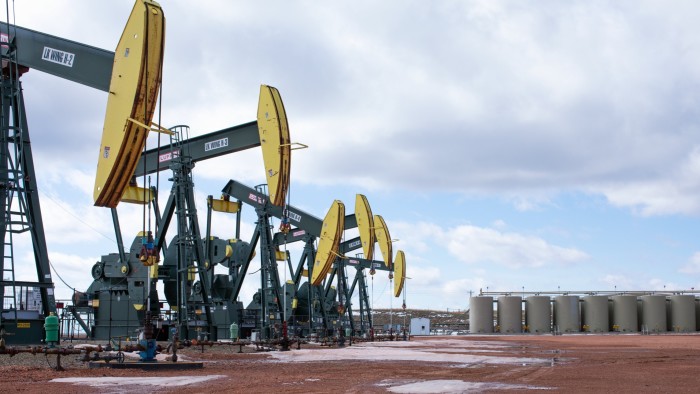Unlock the White House Watch newsletter for free
Your guide to what the 2024 US election means for Washington and the world
Donald Trump’s global trade war is threatening a corner of America that voted in droves for the Republican president last year: oil-producing North Dakota.
It might also upend the president’s plans to boost fossil fuel production in the state that launched America’s shale revolution.
Trump’s tariff rhetoric triggered an oil price sell-off, with US prices plunging below $60 a barrel (West Texas crude settled at $63.08 a barrel on Monday). The escalation raised concerns across the US shale patch, some of the reddest parts of America, about an impending slowdown.
“It’s just scary,” Tracey Dolezal, a commissioner of Dunn County, one of the top oil-producing areas in North Dakota’s Bakken basin, told the Financial Times. The county received nearly $40mn in oil and gas taxes last year, more than half of total revenue.
“There’ll be some job losses. Some businesses are really going to feel the effect if prices keep dropping,” Dolezal said, adding that the county, which voted overwhelmingly for Trump in the past three presidential elections, may have to reduce infrastructure upgrades if prices fall further.

The downturn exacerbates an already bearish outlook for crude. The industry was also contending with new levies from the Trump administration in February on imports of steel and aluminium, which are used for drilling and pipelines.
Matthew Bernstein, Rystad Energy’s manager of upstream shale solutions, said Trump’s tariff policy is “one of the biggest headwinds that’s faced industry in a long time”.
“If it’s sustained and if it’s recessionary, then you’re looking at potentially no growth from US oil this year,” he added.

North Dakota — the third-largest oil-producing state — is especially vulnerable to falling crude prices and slowing production, more so than peers such as Texas and Louisiana, which have more diversified economies. A shrinking inventory of wells and an increasingly consolidated, financially restrained industry, has slowed drilling in the Bakken.
Ron Ness, president of North Dakota Petroleum Council, said: “Falling and volatile commodity prices certainly don’t inspire companies to want to engage and act, particularly the companies that we’re hoping that now have a little wind on their back.”

The White House has called for prices to fall further with trade adviser Peter Navarro last month suggesting $50 oil would help tame inflation, a call that has rattled the US’s shale sector.
“If production drops and the price drops, it makes things more difficult,” said Daniel Stenberg, head of economic development at McKenzie County, another top-producing county in the Bakken and where 85 per cent of the population voted for Trump last year.
Reed Olmstead, executive director of upstream research at S&P Global Commodities Insights, said “$50 oil will not be good for any local economies”. Falling prices “would certainly have ripple effects throughout the region”, he added.
North Dakota reaped the benefits of a technological breakthrough in the 2010s when advances in horizontal drilling and hydraulic fracturing triggered the US shale revolution and transformed the agrarian state’s fortunes.

Production in the Bakken peaked in 2019 at 1.4mn barrels a day under the first Trump administration and is projected to sharply decline in the 2030s, according to Wood Mackenzie. State officials have warned that without a technological breakthrough, production is on the path of “terminal decline”.
The state hopes a controversial technology known as carbon dioxide enhanced oil recovery, which injects the gas into wells to extract hard-to-reach oil reserves, will extend the Bakken’s lifespan. A state-commissioned report released in January estimates carbon dioxide injection could unlock 5bn to 8bn additional barrels of oil over the next 30 to 50 years, adding up to $9bn in tax revenue within the next decade.
“There needs to be a technological advancement that is going to be able to get more out of the rock,” said Jacob Odermann, a spokesperson for Chord Energy, a large Bakken operator.


